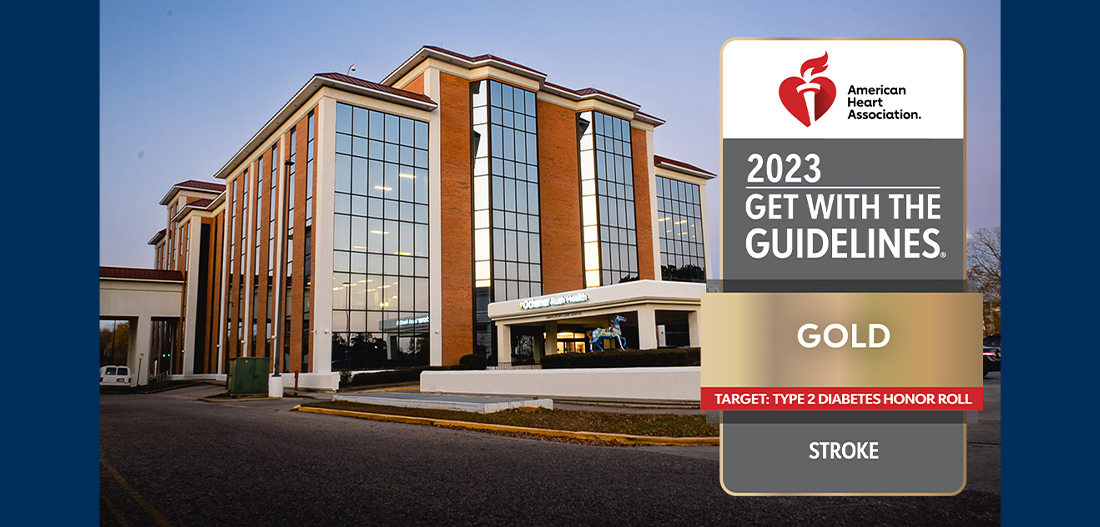601.483.0011 |
601.483.0011 |
Release Date: Jul 21, 2023
 |
The American Heart Association presents Get With The Guidelines Stroke Gold award for proven dedication to ensuring all stroke patients have access to best practices and life saving care
MERIDIAN, Ms. – Ochsner Rush Medical Center has received the American Heart Association’s Get With The Guidelines® - Stroke Gold quality achievement award with Target: Type 2 Diabetes Honor Roll for its commitment to ensuring stroke patients receive the most appropriate treatment according to nationally recognized, research-based guidelines, ultimately leading to more lives saved and reduced disability.
Stroke is the No. 5 cause of death and a leading cause of disability in the U.S. A stroke occurs when a blood vessel that carries oxygen and nutrients to the brain is either blocked by a clot or bursts. When that happens, part of the brain cannot get the blood and oxygen it needs, so brain cells die. Early stroke detection and treatment are key to improving survival, minimizing disability and accelerating recovery times.
Get With The Guidelines puts the expertise of the American Heart Association and American Stroke Association to work for hospitals nationwide, helping ensure patient care is aligned with the latest research and evidence-based guidelines. Get With The Guidelines - Stroke is an in-hospital program for improving stroke care by promoting consistent adherence to these guidelines, which can minimize the long-term effects of a stroke and even prevent death.
“Ochsner Rush Health is committed to providing high-quality patient care by adhering to the latest treatment guidelines,” said Larkin Kennedy, CEO of Ochsner Rush Health. “Get With The Guidelines helps our team to put proven knowledge and guidelines to work on a daily basis, which can lead to faster and better recovery for patients. The end goal is to ensure more people in Meridian and the surrounding region can experience longer, healthier lives.”
Each year, program participants qualify for the award by demonstrating how their organization has committed to providing quality care for stroke patients. In addition to following treatment guidelines, Get With The Guidelines participants also educate patients to help them manage their health and recovery at home.
“We are incredibly pleased to recognize Ochsner Rush Health for its commitment to caring for patients with stroke,” said Steven Messe, M.D., volunteer chairperson of the American Heart Association Stroke System of Care Advisory Group and professor of neurology and director of fellowships of neurology at the Hospital of the University of Pennsylvania. “Participation in Get With The Guidelines is associated with improved patient outcomes, fewer readmissions and lower mortality rates – a win for health care systems, families and communities.”
Ochsner Rush Medical Center also received the American Heart Association’s Target: Type 2 Honor Roll award. Target: Type 2 Diabetes aims to ensure patients with Type 2 diabetes, who might be at higher risk for complications, receive the most up-to-date, evidence-based care when hospitalized due to stroke.
To learn more about stroke care at Ochsner Rush Health, visit ochsnerrush.org/neurology.
ABOUT OCHSNER RUSH HEALTH
Founded more than 100 years ago, Rush Health Systems joined Ochsner Health in 2022, making it part of the largest health system in the Gulf South. With its long legacy of medical innovation, quality care and service to others, Ochsner Rush Health is comprised of 7 hospitals and more than 30 clinics with 250 physicians and 95 advanced practice providers. For more information, please visit ochsnerrush.org and follow us on Facebook, Instagram and Twitter.
ABOUT GET WITH THE GUIDELINES
Get With The Guidelines® is the American Heart Association/American Stroke Association’s hospital-based quality improvement program that provides hospitals with the latest research-based guidelines. Developed with the goal of saving lives and hastening recovery, Get With The Guidelines has touched the lives of more than 12 million patients since 2001. For more information, visit heart.org.